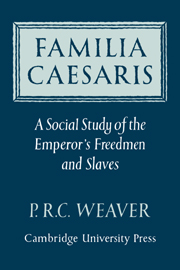Book contents
- Frontmatter
- Contents
- Preface
- Abbreviations
- INTRODUCTION
- PART I NOMENCLATURE AND CHRONOLOGY
- PART II THE FAMILY CIRCLE
- 5 Age at manumission
- 6 Age at marriage
- 7 Status of wives
- 8 Status of children
- 9 The Senatusconsultum Claudianum and the Familia Caesaris
- 10 Women in the Familia Caesaris
- 11 The marriage pattern of slaves and freedmen outside the Familia Caesaris
- PART III THE EMPEROR'S SERVICE
- APPENDIXES
- Bibliography
- Index
- Frontmatter
- Contents
- Preface
- Abbreviations
- INTRODUCTION
- PART I NOMENCLATURE AND CHRONOLOGY
- PART II THE FAMILY CIRCLE
- 5 Age at manumission
- 6 Age at marriage
- 7 Status of wives
- 8 Status of children
- 9 The Senatusconsultum Claudianum and the Familia Caesaris
- 10 Women in the Familia Caesaris
- 11 The marriage pattern of slaves and freedmen outside the Familia Caesaris
- PART III THE EMPEROR'S SERVICE
- APPENDIXES
- Bibliography
- Index
Summary
The next question is to determine, if possible, the status of wives in the Familia Caesaris. What proportion at the time of marriage were freeborn (ingenuae) and how many of servile origin (servae or libertae)} And of the latter, how many were slaves from within the Imperial Familia, and how many belonged to masters other than the emperor and his relatives? These are matters of the greatest importance for the social history of the Familia, and must be studied in at least three dimensions: (1) Chronologically: did the pattern change from the early first to the early third century, and if so why? (2) Geographically: does the pattern vary significantly between the central departments and services in Rome (including Ostia) and Italy, Africa and the other provinces? (3) Seniority: do we find senior freedmen, such as procurators, and slave–freedman officials in favoured careers, favoured also in their family life by marrying more successfully and being more socially mobile than others? The status of the children from these marriages will be considered in the following chapter.
The problem is complicated: only 13% of wives of Caesaris servi give a status indication of any kind, and for wives of Augusti liberti the figure is only 11%. The overall status picture for wives is given in Tables I and III, where the figures are expressed as percentages of all examples of the group in question. Absolute figures are given in parentheses.
- Type
- Chapter
- Information
- Familia CaesarisA Social Study of the Emperor's Freedmen and Slaves, pp. 112 - 136Publisher: Cambridge University PressPrint publication year: 1972



